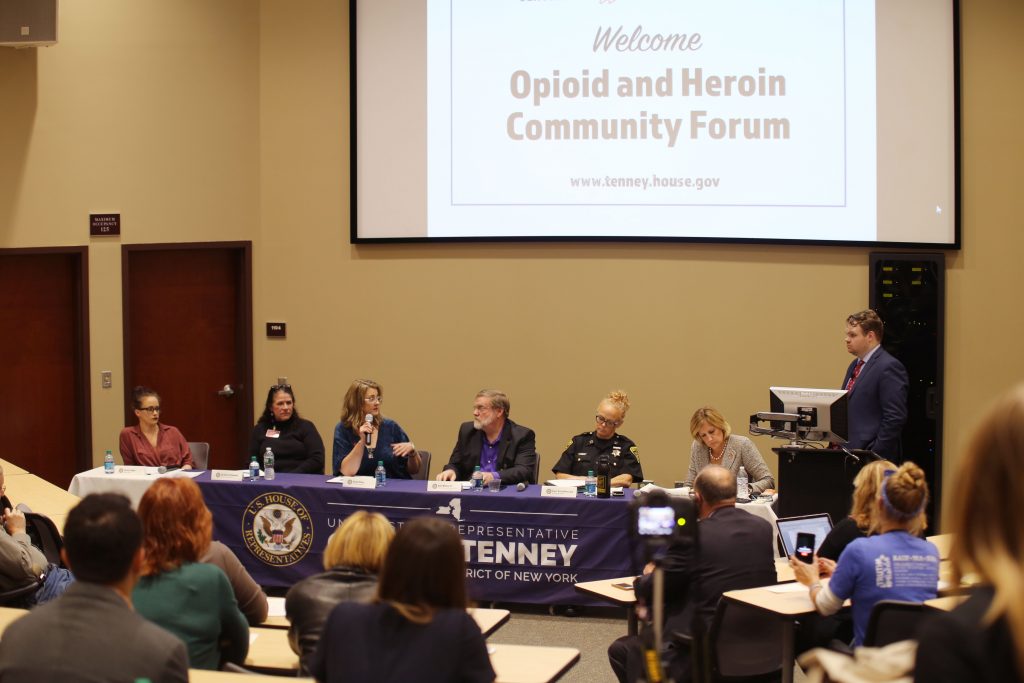
Congresswoman Claudia Tenney (R-22) held a forum to discuss the effects of the Broome County opioid epidemic on Tuesday night.
The forum, held in Symposium Hall at the Center of Excellence at Binghamton University, was meant to raise awareness on the challenges of combating addiction. A panel answered questions from the community attendees.
The panel included Jill Alford-Hammitt, the manager of the alcohol and drug education prevention team at Lourdes Hospital and member of Broome Opioid Abuse Council; Alan Wilmarth, administrative director of behavioral health at United Health Services Hospitals; Alexis Pleus, chief rainmaker at Truth Pharm, a nonprofit that attempts to decrease the stigma associated with addiction; and Jessica Dube, an addiction survivor.
The number of people gaining assistance in combating addiction in the county has risen in recent years. According to data from the New York State Department of Health, the number of unique clients admitted to Office of Alcoholism and Substance Abuse Services certified chemical dependence treatment programs in Broome County rose from 821 in 2015 to 924 in 2016. Many community members who attended the forum looked to increase these numbers by spreading awareness of where addicts can access opioid addiction treatment.
However, according to Wilmarth, treatment can be hard to find for addicts and their families. Due to strict regulations, few doctors are certified to prescribe opioid addiction treatments. Physicians can write prescriptions for narcotics, but need special training to prescribe addiction treatment drugs. Additionally, Wilmarth discussed the links between addiction and mental illness and stressed that the two often need to be treated in harmony.
Dube said she believed the public should be educated on the signs and treatment of addiction as a whole, rather than for any particular substance. But despite the talk of treatment, Alford-Hammitt stressed the importance of prevention starting at a young age. Broome Opioid Abuse Council is currently introducing alcohol, tobacco and other drug information widgets on the school websites. She said she believes reaching out to students in the elementary and middle schools who begin abusing substances will reduce stigma and raise awareness of treatment programs.
In order to maintain successful treatment programs, Tenney said funding is needed. She held the event to discuss ways to sustainably invest in opioid treatment, and answered questions from community members, many of whom expressed their dismay at her vote to begin repealing the Affordable Care Act earlier this year.
Mark Walker, a 65-year-old physician in the city of Binghamton, was one of several constituents who disagreed with Tenney’s vote.
“[Tenney is being] disingenuous and hypocritical because she voted … to repeal the [Affordable Care Act] which is … the only thing we’ve got now through Medicaid supporting 1.3 million people for mental health care and opioid abuse,” Walker said.
Others also appeared to disapprove of Tenney’s vote against the Patient Protection Affordable Care Act. The event ended with a call by Pleus to stop the criminalization of drug use, a stance that is at odds with Tenney’s political views.
Nevertheless, Alford-Hammitt said one of the most important weapons in the fight against the opioid epidemic might not be so political, and hinge more on acknowledging humanity. She said she believes it is important to remember people dealing with addiction should not looked at as morally inept.
“These people, who are dealing with a brain disease are suffering, and yet it’s a moral failing on their part?” Alford-Hammitt said. “It is most certainly not.”


